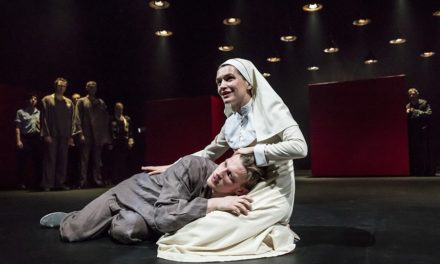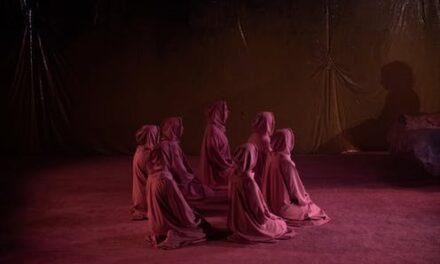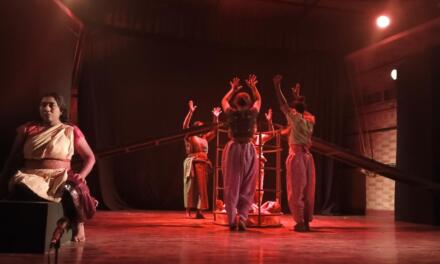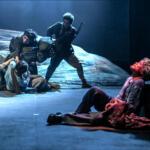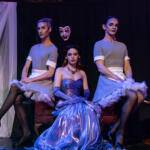The five-hundred-year history of Italy’s Commedia dell’Arte is neatly packed into Masquerade, a truly entertaining show, which offers a taste of Italy, past and present. The three strong cast of Bologna’s celebrated Fraternal Compagnia has embarked on a world tour taking in some European countries and China, with a month’s stay at the Edinburgh fringe, where they are performing at C Aquila venue. What is it that makes Commedia dell’Arte live on, I wonder, as I come out of the show. You can find one of the answers, the minute you take your seat in the auditorium and observe the expressive Commedia masks lined up on coat-hangers on either side of the stage. Masks have accompanied the development of Western theatre from the very beginning, and still today they have the power to lift a play above realism into the realms of the magical and the universal. I reflect on the greed and lust embodied in the Pantaloon mask, staring back at me, or the dark mask of a downtrodden, always famished Arlecchino. They strike me as alive today as they were in 1575 when a Commedia dell’Arte troupe, led by Drusiano Martinelli, paid a visit to Queen Elisabeth’s court. This probably included among its members, a nineteen-year-old Tristano Martinelli, the amazing performer and impresario from Mantua, who invented the Harlequin mask.
We’re at the Edinburgh Fringe, where each slot runs at about 55 minutes, so time is of the essence, and a Presenter figure (Gabriel Bird) is goading his fellow cast members, Pizza (Luca Comastri) and Pasta (Tania Passarini), to get a move on. They’ve got to keep punters happy and get through the entire five-hundred-year history of Commedia dell’Arte in less than an hour. What’s more, they’re on their own, the Presenter informs them, making a typical Commedia allusion to contemporary issues. The rest of the company have had to return to Italy, due to Brexit which severely clamped down on immigration. Pizza and Pasta protest but then give in, their lively, witty banter, continuing throughout the show. The first scene kicks off, with Pizza and Pasta in the roles of bedraggled travelling players in the 1400s, struggling to survive and tormented by treacherous fleas, which they curse in the hilarious chant, ‘pulci traditori’ (‘treacherous fleas’). Thanks to their masterful physicality, we empathise with their torment and pain, becoming acutely aware of their dogged determination to keep going. In another scene the trio whisks us off to Venice, where we meet the wealthy Pantaloon, who is facing Death; the latter dons a sinister black mask. The Presenter invites the audience to conjure up the scene in Venice, by making the sound of waves, imitating a lively Venetian crowd as well as a flock of birds. Pantaloon, who has spent his life obsessed with money and wealth, desperately clutches a bundle of coins, pleading with Death to give him a few days longer. Still Death enjoys playing games with Pantaloon, tugging at his money bag, knocking repeatedly on his door and keeping him guessing if he will end up in Hell or Heaven, so creating a tragi-comic scene that points to the universal truth that we must all die, rich and poor alike. Instead, the scene, featuring the Captain, another famous Commedia mask, alludes to war, masculinity and machoism. Onstage two Captains (Capitani), each flexing his muscles and brandishing a makeshift sword, strives to convince his opponent and us, the audience, that he is the best, the strongest, the most heroic. Then Isabella Andreini, the celebrated ‘queen’ of Commedia dell’Arte, puts in an appearance and soon deflates the overblown egos of these pompous army men. Women, Isabella reminds us, had considerable power in the Commedia troupes, as performers but also as managers. And a final word about the larger-than-life Doctor (Dottore), who gives the audience a hilarious lesson in making and cooking pasta. As he guides us through the various stages, our man reveals his passion for the hen that every day lays fresh eggs which emerge from his chest and drop directly into his floury hand. There’s also Hugo, the friendly cow, condemned to die to provide him with his tasty meat pasta filling. The finished dish is of course the delicious tortellini, typical of Bologna, where the Doctor hails from. The show, written and directed by Massimo Macchiavelli and Luca Comastri, is in English with some Italian and Bolognese dialect thrown in. However, don’t worry, even if you don’t know Italian or Bolognese, the visuals and physicality of this first-class Commedia troupe will make sure you come out feeling as if you do.
This post was written by the author in their personal capacity.The opinions expressed in this article are the author’s own and do not reflect the view of The Theatre Times, their staff or collaborators.
This post was written by Margaret Rose.
The views expressed here belong to the author and do not necessarily reflect our views and opinions.




